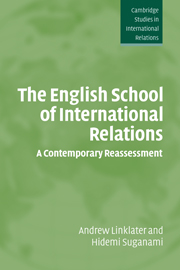Book contents
- Frontmatter
- Contents
- Acknowledgements
- Introduction
- 1 The idea of ‘the English School’ as a historical construct
- 2 The argument of the English School
- 3 The English School on ‘International Relations as an intellectual pursuit’
- 4 Progress and its limits: system, society and community in world politics
- 5 Cosmopolitanism and the harm principle in world politics
- 6 The sociology of states-systems
- 7 The good international citizen and the transformation of international society
- Conclusion
- Bibliography
- Index
- CAMBRIDGE STUDIES IN INTERNATIONAL RELATIONS
Introduction
Published online by Cambridge University Press: 22 September 2009
- Frontmatter
- Contents
- Acknowledgements
- Introduction
- 1 The idea of ‘the English School’ as a historical construct
- 2 The argument of the English School
- 3 The English School on ‘International Relations as an intellectual pursuit’
- 4 Progress and its limits: system, society and community in world politics
- 5 Cosmopolitanism and the harm principle in world politics
- 6 The sociology of states-systems
- 7 The good international citizen and the transformation of international society
- Conclusion
- Bibliography
- Index
- CAMBRIDGE STUDIES IN INTERNATIONAL RELATIONS
Summary
The present volume, written in close collaboration by Hidemi Suganami and Andrew Linklater, is the first book-length attempt to detail the essential features of the so-called English School of International Relations and to demonstrate how some of its key texts and ideas can provide a basis for a historically informed and normatively progressivist understanding of contemporary international relations.
Our initial idea to produce a collaborative work on the theme of the English School emerged while we taught together in the Department of International Relations at Keele University. The subject was an obvious choice for our collaboration. Since his arrival in the UK in 1970 as a graduate student, Suganami has been closely acquainted with several scholars, and their works, whose names it has become customary to relate to the label, ‘the English School’. Although his own interests in the study of international relations go beyond the traditional research parameters of English School writers (see, e.g., Suganami, 1996), some of their early publications (e.g., Manning, 1975) had a formative influence on his understanding of the institutional structure of contemporary international society (see Suganami, 1982, 1983, 1989, 2001a). Over the same period, Linklater had dedicated much of his scholarly work to developing a cosmopolitan perspective, arguing for the necessity and possibility of reducing the areas in which the institutional distinction between citizens and outsiders is treated as morally relevant in the practice of world politics (see, in particular, Linklater 1982, 1990, 1998).
- Type
- Chapter
- Information
- The English School of International RelationsA Contemporary Reassessment, pp. 1 - 11Publisher: Cambridge University PressPrint publication year: 2006

